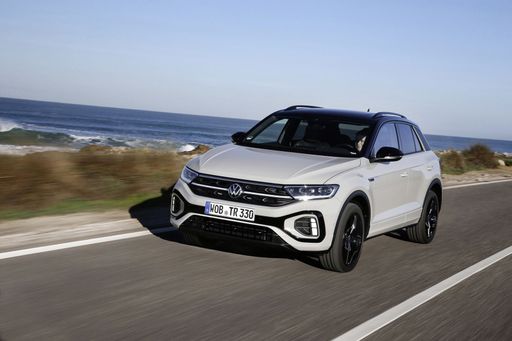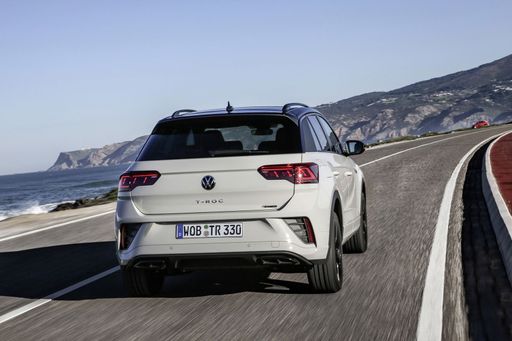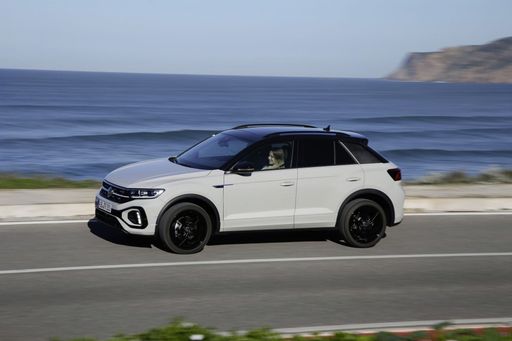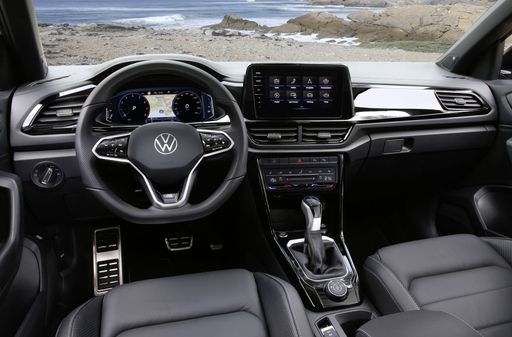Toyota Yaris vs VW T-Roc – Differences & prices compared
Compare performance, boot space, consumption and price in one view.
Find out now: which car is the better choice for you – Toyota Yaris or VW T-Roc?
The Toyota Yaris (Hatchback) comes with a Full Hybrid or Petrol engine and Automatic or Manuel transmission. In comparison, the VW T-Roc (SUV) features a Petrol or Petrol MHEV engine with Manuel or Automatic transmission.
When it comes to boot capacity, the Toyota Yaris offers 286 L, while the VW T-Roc provides 475 L – depending on how much space you need. If you’re looking for more power, decide whether the 280 HP of the Toyota Yaris or the 150 HP of the VW T-Roc suits your needs better.
In terms of consumption, the values are 3.80 L per 100 km for the Toyota Yaris, and 5.50 L for the VW T-Roc.
Price-wise, the Toyota Yaris starts at 21900 £, while the VW T-Roc is available from 26400 £. Compare all the details and find out which model fits your lifestyle best!
Toyota Yaris
The Toyota Yaris exudes a charming blend of practicality and style, making it an appealing choice for urban drivers. Its compact design allows for easy manoeuvrability in crowded city streets, while the interior offers a surprisingly spacious and comfortable environment. With a focus on fuel efficiency and reliability, the Yaris remains a popular option for those seeking a balance between performance and economy.
details @ Toyota
@ Toyota
 @ Toyota
@ Toyota
VW T-Roc
The VW T-Roc seamlessly blends stylish design with practical functionality, making it an ideal choice for those who enjoy both urban and countryside driving. Its modern interior features intuitive technology and comfortable seating, enhancing the overall driving experience. With its robust build and dynamic performance, the T-Roc is equipped to handle various road conditions with confidence.
details @ Volkswagen
@ Volkswagen
 @ Volkswagen
@ Volkswagen
 @ Volkswagen
@ Volkswagen
 @ Volkswagen
@ Volkswagen

|

|
|
|
|
Costs and Consumption |
|
|---|---|
|
Price
21900 - 46700 £
|
Price
26400 - 38000 £
|
|
Consumption L/100km
3.8 - 9.5 L
|
Consumption L/100km
5.5 - 6.3 L
|
|
Consumption kWh/100km
-
|
Consumption kWh/100km
-
|
|
Electric Range
-
|
Electric Range
-
|
|
Battery Capacity
-
|
Battery Capacity
-
|
|
co2
87 - 215 g/km
|
co2
126 - 143 g/km
|
|
Fuel tank capacity
36 - 50 L
|
Fuel tank capacity
50 L
|
Dimensions and Body |
|
|---|---|
|
Body Type
Hatchback
|
Body Type
SUV
|
|
Seats
4 - 5
|
Seats
4 - 5
|
|
Doors
3 - 5
|
Doors
2 - 5
|
|
Curb weight
1090 - 1356 kg
|
Curb weight
1465 - 1539 kg
|
|
Trunk capacity
141 - 286 L
|
Trunk capacity
284 - 475 L
|
|
Length
3940 - 3995 mm
|
Length
4271 - 4373 mm
|
|
Width
1745 - 1805 mm
|
Width
1811 - 1828 mm
|
|
Height
1455 - 1500 mm
|
Height
1527 - 1573 mm
|
|
Payload
289 - 525 kg
|
Payload
368 - 515 kg
|
Engine and Performance |
|
|---|---|
|
Engine Type
Full Hybrid, Petrol
|
Engine Type
Petrol, Petrol MHEV
|
|
Transmission
Automatic, Manuel
|
Transmission
Manuel, Automatic
|
|
Transmission Detail
CVT, Manual Gearbox, Automatic Gearbox
|
Transmission Detail
Manual Gearbox, Dual-Clutch Automatic
|
|
Drive Type
Front-Wheel Drive, All-Wheel Drive
|
Drive Type
Front-Wheel Drive
|
|
Power HP
116 - 280 HP
|
Power HP
115 - 150 HP
|
|
Acceleration 0-100km/h
5.5 - 9.7 s
|
Acceleration 0-100km/h
8.9 - 12.3 s
|
|
Max Speed
175 - 230 km/h
|
Max Speed
187 - 212 km/h
|
|
Torque
390 Nm
|
Torque
200 - 250 Nm
|
|
Number of Cylinders
3
|
Number of Cylinders
3 - 4
|
|
Power kW
85 - 206 kW
|
Power kW
85 - 110 kW
|
|
Engine capacity
1490 - 1618 cm3
|
Engine capacity
999 - 1498 cm3
|
General |
|
|---|---|
|
Model Year
2024 - 2025
|
Model Year
2024 - 2025
|
|
CO2 Efficiency Class
B, G
|
CO2 Efficiency Class
E, D
|
|
Brand
Toyota
|
Brand
VW
|
Toyota Yaris
Introducing the Next-Gen Toyota Yaris: A Blend of Innovation and Technology
The Toyota Yaris has long been lauded for its efficiency, reliability, and practicality. As we venture into the 2024 model year, Toyota has upped the ante with the latest versions of this popular hatchback, melding cutting-edge technology with eco-conscious design. Here’s an in-depth look at what makes the current Yaris line-up stand out from the crowd.
Efficient Powertrains: Hybrid and Beyond
Spearheading the technological innovation in the Yaris range is the introduction of various hybrid models. The Yaris offers a 1.5-litre full-hybrid engine, marrying a petrol engine with an electric motor to produce between 116 and 130 PS. This power blend is controlled via a sophisticated CVT-gearbox, optimizing both performance and fuel efficiency, with consumption figures ranging from an impressive 3.8 to 4.2 litres per 100 km.
For those seeking pure performance, the GR Yaris variants provide a turbocharged 1.6-litre engine capable of producing 280 PS. This power is delivered via a choice of manual or automatic transmission, giving drivers the tactile involvement or convenience they desire.
Design that Fulfils and Inspires
The Yaris hasn't forgotten its roots as a compact, city-friendly hatchback, measuring between 3,940 and 3,995 mm in length. With its bold front grille, sleek lines, and a choice of striking colours, it's a car that turns heads while remaining perfectly suited for urban environments.
The interior is equally impressive, designed with a focus on driver convenience and comfort. Depending on the variant, Yaris can offer generous cargo space of up to 286 litres, making it a perfect companion for everyday tasks or weekend escapes.
Technological Integration: The Smart Choice
Toyota's approach goes beyond just improving engine technology; the Yaris is packed with innovative features aimed at enhancing the driving experience. It boasts a suite of advanced safety systems such as lane departure alert, pre-collision system, and adaptive cruise control, ensuring peace of mind on the road.
The infotainment system in the Yaris is designed to keep you connected, offering seamless smartphone integration, a user-friendly interface, and an intuitive navigation system, ensuring that you're always informed and entertained.
The Cost of Innovation
Owning a Yaris is not just about impressive technology; it's also about making economic sense. With a price range between €25,500 and €49,990, and monthly costs spanning from €748 to €1,513, it offers a broad spectrum to suit different budget needs.
Concerned about emissions? You can rest easy knowing that the Yaris boasts a CO2 efficiency class ranging from B to G, thanks to its low emissions output of between 87 to 215 g/km.
Conclusion: The Toyota Yaris Drives the Future
The Toyota Yaris continues to be a strong contender in the compact car segment, pushing boundaries with its innovative full-hybrid systems and performance-oriented GR models. It's a remarkable blend of design, technology, and economy, ensuring it remains a top choice for drivers who demand more from their hatchbacks.
Whether you're seeking the efficiency of a hybrid or the thrill of the GR Yaris, there's a model tailored to your unique driving needs in Toyota's latest Yaris lineup.
VW T-Roc
The VW T-Roc: A Blend of Style and Innovation
The Volkswagen T-Roc stands out in the competitive compact SUV segment, offering a dynamic combination of innovative technology and stylish design. The model has evolved since its inception, embracing new features and engineering advancements that appeal to a broad spectrum of drivers.
Engine Performance and Efficiency
The VW T-Roc provides an impressive range of engine options to meet various driving preferences. From the economical 1.0 TSI petrol engines to the robust 2.0 TDI diesels, there’s an engine to match every need. The power output spans from 115 PS to a thrilling 300 PS in the T-Roc R variant. Fuel efficiency is another highlight, with consumption figures ranging between 4.7 and 8.5 L/100 km, making it a practical choice for both city and long-distance driving.
Advanced Technology and Safety Features
Volkswagen has equipped the T-Roc with state-of-the-art technology to enhance both convenience and safety. The latest models include advanced driver assistance systems, such as adaptive cruise control and lane-keeping assist, which provide a safer driving experience. Additionally, the intuitive infotainment system supports a seamless connection to smartphones via Apple CarPlay and Android Auto.
Design and Customisation
The T-Roc’s design is bold and contemporary, reflecting its sporty nature. With a wide array of customisation options, including various trim levels like Life, Style, and the sporty R-Line, there are plenty of opportunities for personal expression. Both the interior and exterior can be tailored, with choices ranging from colour accents to different upholstery options, ensuring each T-Roc feels unique to its owner.
Spacious Interior and Practicality
Despite its compact exterior dimensions, the T-Roc offers a surprisingly spacious interior. It accommodates between four and five passengers comfortably, with ample legroom and headroom. The flexibility extends to the boot space, which ranges from 284 to 445 litres, depending on the configuration, providing practical storage capacity for everyday use or weekend getaways.
Conclusion: A Competitive SUV Choice
Overall, the VW T-Roc continues to be a strong contender in the compact SUV market, combining innovative features, efficient engines, and a distinctive design. It appeals to those looking for versatility and performance in a stylish package, making it an attractive option for both families and individual adventurers alike.
What drivetrain options does the Toyota Yaris have?
The Toyota Yaris is offered with Front-Wheel Drive or All-Wheel Drive.
The prices and data displayed are estimates based on German list prices and may vary by country. This information is not legally binding.
